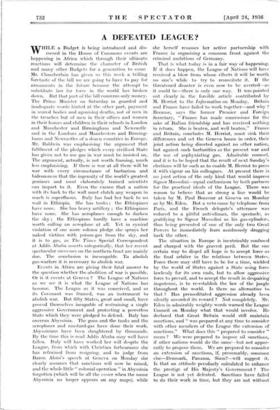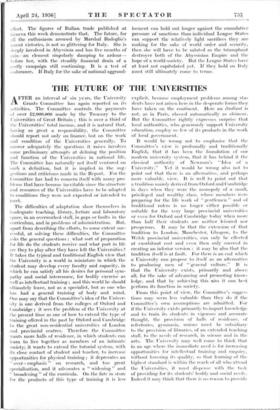A DEFEATED LEAGUE?
WHILE a Budget is being introduced and dis- cussed in the House of Commons events are happening in Africa which through their ultimate reactions will determine the character of British and many other Budgets for a generation to come Mr. Chamberlain has given us this week a trifling foretaste of the bill we are going to have to pay for armaments in the future because the attempt to, substitute law for force in the world has broken down. But that part of the bill concerns only money. The Prime Minister on Saturday in guarded and inadequate words hinted at the other part, payment in seared bodies and agonising deaths, not of men in the trenches but of men in their offices and women in their homes and children in their schools in London and Manchester and Birmingham and Newcastle . and in the Londons and Manchesters and Birming- hams and Neweastles of a dozen countries in Europe. Mr. Baldwin was emphasising the argument that fulfilment of the pledges which every civilised State has given not to use gas in war must be insisted on. The argument, actually, is not worth framing, much less emphasising. If there is war at all there will be war with every circumstance of barbarism and hideousness that the ingenuity of the world's greatest geniuses and most elaborately trained scientists can impart to it. Even the excuse that a nation with its back to the wall must clutch any weapon in reach is superfluous. Italy has had her back to no wall in Ethiopia. She has tanks ; the Ethiopians have none. She has heavy artillery ; the Ethiopians have none. She has aeroplanes enough to darken the sky ; the Ethiopians hardly have a machine worth calling an aeroplane at all. Yet in cynical violation of one more solemn pledge she sprays her naked victims with poison-gas from the sky, and it is to gas, as The Times Special Correspondent at Addis Ababa asserts categorically, that her recent spectacular successes on the northern front are mainly due. The conclusion is inescapable. To abolish gas-warfare it is necessary to abolish war.
Events in Africa are giving their fatal answer to the question whether the abolition of war is possible. Or is it events at Geneva ? The League of Nations as we see it is what the League of Nations has become. The League as it was conceived, and as its Covenant was framed, was an instrument to abolish war. But fifty States, great and small, have proved themselves incapable of restraining a single aggressive Government and protecting a powerless State which they were pledged to defend. Italy has overrun Abyssinia. The guns and the tanks and the aeroplanes and mustard-gas have done their work.• Abyssinians have been slaughtered by thousands. By the time this is read Addis Ababa may well have fallen. Italy will have worked her will despite the League, from which with Christian forbearance she has refrained from resigning, and to judge from Baron Aloisi's speech at Geneva on Monday she clearly assumes that sanctions will now be raised,' and the whole little" colonial operation "in Abyssinia forgotten (which will be all the easier when the name Abyssinia no longer appears on any maps), while
she herself resumes her active partnership with France in organising a common front against the criminal ambitions of Germany.
That is what today is in a fair way of happening. If it does happen, the League of Nations will have received a blow from whose effects it will be worth no one's while to try to resuscitate it. If the threatened disaster is even now to be averted—as it could be---there is only one way. It was pointed out clearly in the forcible article contributed. by M. Herriot to the Information on Monday. Britain and France have failed to work together—and why ? Because, says the former Premier and Foreign Secretary, "France has made concessions for the sake of Italian friendship and has received nothing in return. She is beaten, and well beaten." France and Britain, concludes M. Herriot, must sink their differences and set the Geneva house in order, their joint action being directed against no other nation, but against such barbarities as the present war and the use of asphyxiating gas. Admirable counsel, and it is to be hoped that the result of next Sunday's elections will be such as to enable M. Herriot to press it with vigour on his colleagues. At present there is no joint action of the only kind that would impress Signor Mussolini—equal enthusiasm by both partners for the practical ideals of the League. There was reason to believe that as strong a line would be taken by M. Paul Boneour at Geneva on Monday as by Mr. Eden. But a veto came by telephone from Paris, and the French delegate's utterance was reduced to a pitiful anti-climax, the spectacle, as gratifying to Signor Mussolini as his gas-cylinders, thus being presented of one of the only two Great Powers he immediately fears assiduously dragging back the other.
The situation in Europe is inextricably confused and charged with the gravest peril. But the one certain way to dispel all hope is to accept force as. the final arbiter in the relations between States. Force there may still have to be for a time, wielded. by the world of States against a State using force, lawlessly for its own ends, but to allow aggressive
force to prevail, and to accept the result in despairing' impotence, is to re-establish the law of the jungle,
throughout the world. Is there no alternative to. that ? Has premeditated aggression already been: silently accorded its reward ? Not completely. Mr. Eden in admirably weighty words warned the League Council on Monday what that would involve. 'He declared that Great Britain would still maintain sanctions, and "was prepared at any time to consider with other members of the League the extension Of sanctions." What does this "prepared to consider" - mean ? We were prepared to impose oil sanctions, if other nations would do the same—but not appar- ently to propose them. We are prepared to consider an extension of sanctions, if, presumably, someone else—Denmark, Panama, Siam?—will suggest it.' Is that an attitude peculiarly calculated to enhance the prestige of His Majesty's Government ? The League is not yet defeated.- Sanctions have failed to do their work in time, but they are not without' ffect. The figures of Italian trade published at Geneva this week demonstrate that. The future, for all the enthusiasm aroused by Marshal Badoglio's recent victories, is not so glittering for Italy. She is deeply involved in Abyssinia and has five months of rain—an element singularly damping to ardour— before her, with the steadily financial drain of a costly campaign still continuing. It is a test of endurance. If Italy for the sake of national aggrand- isement can hold out longer against the cumulative pressure of sanctions than individual League States can support the relatively light sacrifices they are making for the sake of world order and security, then she will have to be saluted as the triumphant destroyer both of the Abyssinian Empire and the hope of a world-society. But the League States have at least not capitulated yet. If they hold on Italy must still ultimately come to terms.



















































 Previous page
Previous page